Pandemic: The Full Exclusive Interview with Matt Leacock!

Pandemic has changed the way we think about co-operative games. Designed by Matt Leacock (@mleacock), Pandemic stormed onto the scene and proved that co-operative board gaming could win the hearts and minds of players all over the world.
Rules of Play went behind the scenes to find out what went into designing Pandemic and how Matt Leacock developed one of the best games in recent memory...
Rules of Play: Where did the original inspiration for Pandemic come from?
Matt Leacock: At the time I had been trying to get a game published for a very long time, so I had been working on a bunch of games. When I was developing Pandemic I'd played Reiner Knizia's Lord of the Rings, which helped me understand that a cooperative game could actually be fun and not just a kids educational thing. I was really impressed with the ways that Lord of the Rings captured a lot of tension and kept people engaged. But I really wanted to design a game I could play with my wife where we would end up feeling good, whether we won or not.
I wanted something that would be fun with the family and close friends so nothing really too into heavy competition, so I wanted to try my hand a co-operative-based game. The disease element actually came from a couple of different things. They've been in the news now for so long now I'm trying to think what the pandemic of the day was. I have a hard time recalling because we've seen Bird Flu and Swine Flu and Sars and so many things sweep through.
But what I really wanted to do was create a game with wicked chain reactions in it with things that spiral out of control. You really have to work together, even at the easiest levels or you will lose.

RoP: How did you go about designing the aesthetics of the board and the pieces?
ML: I put together the prototype version of the game over about three years and I ended up pitching it to Z-Man Games. Zev Shlasinger, head of Z-Man Games at the time, signed of on it and arranged artwork for the first printing of the game. There was one artist that painted the board and the cover of the box and then another graphic designer came and did the layout. And I was pretty heavily involved trying to help art-direct that, so Zev [Shlasinger] basically served as a middleman and I approved stuff and sent a lot of stuff back for edits.
Then Z-Man was purchased a couple of years back by Filosofia Games and it issued a second edition of the game. It's got brand new art work which brought it up to a nice professional level. I was pretty heavily involved in that, too.
With both the covers the initial sketches I got back I rejected out of hand because they showed burnt bodies and panic and things like that. I really wanted it to be seen as way that a team of people could overcome adversity and it wasn't all about fear mongering and show the horrors of it. This game is really about how you can triumph over those things.Yes, it's scary, but the great thing is, hey, you can win!
There's a female scientist front and centre on there; I've got some daughters that are under represented in the hobby, so I really wanted that in there. It's about pandemics so there's a widely diverse cast of characters that you can play as. And all of these things are really important to me and I was able to communicate that to Z-Man and they were totally on board with it, for both printings.

RoP: There's a real clinical edge to the game and the artwork, was this intentional?
ML: And that's exactly what we bandied around. You don't want it to feel like you have to wash your hands after playing the game and you don't want to feel creeped out about it. You need a certain amount of disconnect from it and that's part of the reason why we didn't name the diseases.
I felt really strongly that they should not have names because it makes the game a bit more ever-green. You can throw whatever disease of the year at it. And if you know someone that was lost to one of those diseases, that's horrible; why would you want to play that game?
RoP: Pandemic received a lot of attention earlier in the year due to the Ebola outbreak...
ML: It's certainly easier to talk about the game when you're modelling triumphing over [Ebola]. As supposed to playing as the disease and you're trying to wipe out humanity. It's a little hard to defend games like that, they feel kind of creepy. [Pandemic's] sort of like an 8th graders understanding of how disease control works. You have to get into that mindset and fight back a little bit.
RoP: Where did the design of the various roles come from?
ML: When I initially designed the game, in the formative stages, the players all moved grey pawns. It was almost funny, there were three pawns no matter how many players you had and they were completely undifferentiated with no Roles at all. It was only after evolving the game and talking with people that the idea of the Roles came about.
My method is to try and figure out how far I can push it. The Medic character is actually really, really powerful. But I think what makes them successful is they're not just tiny tweaks between the Roles. I really tried to push them as far as I could. At a certain point it does become a little difficult to come up with new ones but we've got something like 14 roles across all the games now.
There are enough little knobs and levers to help keep making it interesting. We have run out of colours, though!

RoP: Is it difficult to design a game that's both accessible as well as complex enough to keep players coming back?
ML: I could probably talk for an hour about that. There's a lot to it. You want the game to be difficult to win, but not complex to understand. Basically, you're looking for simple behaviours you can wire into the game so that when you're playing it things emerge from it. You're not reading a lot of text, these behaviours emerge from a very simple rule-set. If you can keep the number of things the players need to understand down, so it's really about them having meaningful decisions every turn.
And meaningful in that, players know what is going on and that each decision is going to have consequences and they're aware that if they make a bad choice the game might go off the rails. So that's one thing, just trying to keep the complexity of interaction down to reduce the cognitive overhead so players don't have to look at the rulebook the whole time.
That's one thing and the other is providing a variety of encounters. If you play it one time and win or lose you can try it again and you've got a new mix of options. If the diseases are showing up in different places, you have different roles, maybe you have a different difficulty level that's more of appropriate to your experience at the time; that sort of thing is another important piece.
RoP: Did you always have the expansions in mind?
ML: I wasn't designing it for expansions and initially I thought the [game] systems were too fragile to handle it. But it turned out to be pretty robust and we've been able to add more and more expansions to it for people who have played it. I didn't anticipate that people would play it 100 or 200 times, but people really wanted more variety and that's great.
There were a lot of different ideas online and a lot of ideas that other designers proposed. I was able to collaborate with Tom Lehmann who has been my co-designer on all the expansions and we'd throw things back and forth together all the time. And it's fun to come up with new stuff and new ways to stretch the the system out.
RoP: Will that continue?
ML: Well, our third expansion is out, it's called Pandemic: State of Emergency. And then this Fall we've announced Pandemic Legacy, which is a whole new way of experiencing the game because every time you play it changes. Like Risk Legacy, you play the game and as you're playing it you get new instructions in the form of packets or unlocks and you follow the instructions, you put on stickers, you write on the board, your tear up cards and you do all sorts of things like that.
Your game evolves in a unique way to your play group. Another person playing the game will have a totally different experience because they'll have a different board and different characters. That allows you to play out a series of games, a total of 24 games, almost like a TV season with a larger arc.

RoP: Episodic board games?
ML: Yeah, it's a really new idea. I've co-designed it with Rob Daviau who has pioneered this new up and coming genre with Risk Legacy and there really haven't been any games on the market since and it delivers a lot of potential, firstly for story-telling, but also managing complexities because you can gradually introduce rules over time.
Do you feel like there's a lack of co-operative games out there?
I actually went back and did some digging and I looked at the number of titles that had co-operative play elements - all the way back to 1976/79, somewhere around there - using the BoardGameGeek database and the number was right around 4/5% year-over-year with some fluctuation. After Pandemic came out it shot up quite a bit and it's never back down since. The genre has been established and there are far more games now with a co-operative element in them.
RoP: Board games are more popular than ever...
ML: Yeah, it's been documented by the New York Times as growing between 10-15% each year for the past five years, I think. It's a good time to play games! Some of the popularity is probably due to the internet. You can research games and learn more about them before you buy them and you can see video overviews or watch TableTop, there's a lot more available for you before you make that blind purchasing decision.
RoP: Could the popularity be a reaction against all the technology that's now around us?
ML: Yeah, you're behind a screen all day and you're going to go home and play a video game? [Board games] are a nice way to reconnect with other people and actually make eye contact with them across a table. It's kind of an excuse for having a conversation.

RoP: What are you playing right now?
ML: Let's see... I played a lot of Skyrealms last year. It's probably my most played game of the year. It's a simple deck builder and it's portable. I liked Splendour quite a bit when that came out, a really simple family game. Family games you can play for 40-45 minutes and they're high interaction and good readability and low complexity.
I don't have any patience for two hour long games. Even 90 minutes is kind of stretching it. There are so many games out there I want to play, and more than one in a session. I've been playing with the same group of people every week for the last 16 years now. We like to see new stuff and we like to go back to our favourites, but it's rare that we'll block off a whole evening for a new game.
RoP: What do you see as the limitations of gaming as a medium? Where do you think board games will go in the future?
ML: It's hard to say... there are some fundamental limits. There's only so much you can do to make a game and hit a certain price point. There's only so many rules you can give people before they've got cognitive overload with too many of them. But, there's some interesting innovative places to go there. A lot of people are trying to crack the combination of keeping the value of face-to-face time that a board game brings and the shared common space but you're able to offload a lot of the book keeping to a device what would a game look like?

How would it work. I know people are going to keep chipping away at the idea. I don't think anyone has done a good job of it yet; it's sort of like a solution in search of a problem. There will indelibly be some innovations there. I think there's plenty of room for co-op games to evolve in particular. The way people have been designing them over the last five or ten years... it just hasn't been that long.
There are probably a lot of different ways you can unlock a story just using paper, dice and cards so we'll see what happens there. But then you never know what the next new innovation is going to be, it's impossible to predict. Who would have thought that deck building would become such a big hit and bring forth so many different incarnations. There may be another one of those just around the corner.
If you fancy playing Pandemic head straight to Rules of Play's shop.
Get involved in the conversation, follow us on Twitter: @rulescardiff or join us on Facebook: Rules of Play. Keep an eye out for more interviews and features, too. We'll have more going up on the site soon!

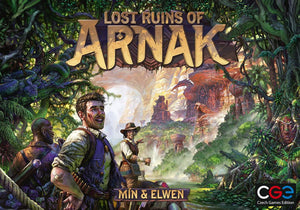
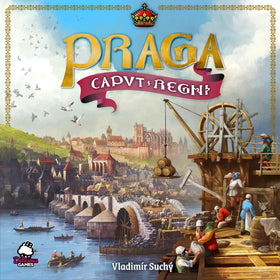
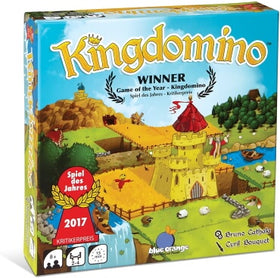
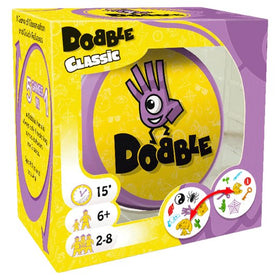
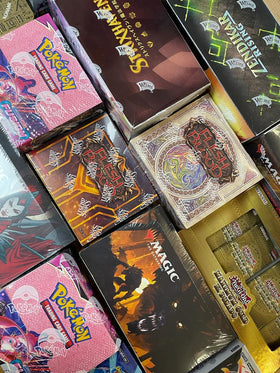
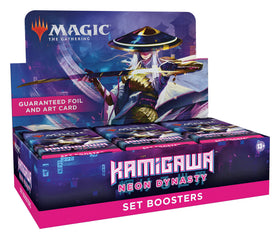
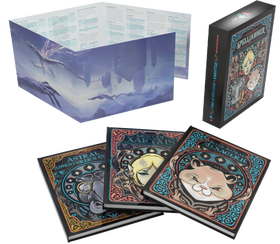
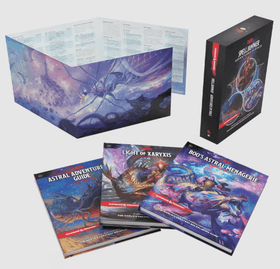
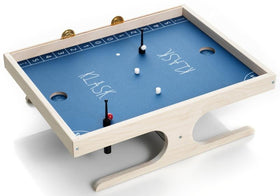
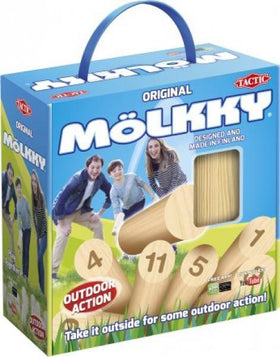
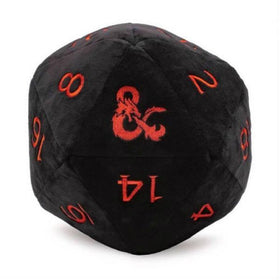
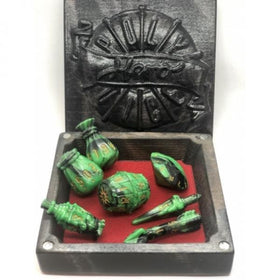
Leave a comment